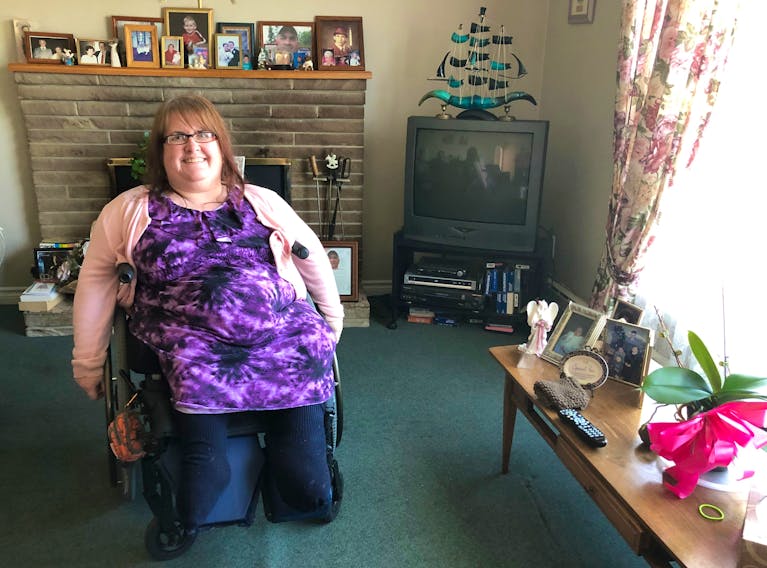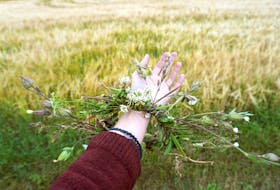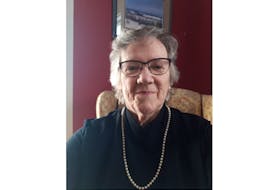COXHEATH, N.S. — Susan Burke has no regrets about chasing down the mother who quieted her son and pulled him away when he asked why Burke was in a wheelchair.
The Coxheath resident, who was born with spina bifida and has scoliosis, has used a wheelchair her whole life and overheard the young boy ask his mother the question while they were crossing paths near a Cape Breton Regional Hospital entrance.
Following the woman and child inside, Burke got their attention and told the mother she wanted to answer her son's question.
"She kind of looked at me, gave me a dirty look, right," said Burke. "I said to him, sweetie, you asked back there why I was in a wheelchair? I said this is the way God made me. I said he made you to walk and he made me not to walk."
This was the only time the 51-year-old has had a situation like this, where Burke and her wheelchair were treated like something not to be discussed.
From classmates to co-workers and teachers to employers, Burke felt accepted for who she was. And employers were understanding of extra time off due to health issues she would have.
"I would be upfront with them," she said, sitting in the living room of her home where she grew up.
"I'd tell them if I have to take a day off it's because I have to not because I just want to."

Bio: Susan Burke
- Age: 51
- Lives in: Coxheath
- High school: Riverview Rural (1984-1987)
- Post-secondary: University College of Cape Breton
- Biggest advocates: Her parents Dave and Jean (MacDonald)
- Loves: Anne Murray, The Sound of Music and Three's Company
- Hates: Winter
- Volunteers: With any organization needing help
- Born with: Spina Bifida
- Type: Myelomeningocele
- It effects: Lower half of her body
Wants people to know:
"I might be in the chair, but the chair doesn't stop me."
However, Burke said there was a big challenge she had growing up in a wheelchair — accessibility, especially in schools.
"Back in the '70s, there was no ramps, no elevators. I had to get lifted up stairs, carried up stairs," Burke said.
"They did have a ramp at Coxheath school but they just kind of attached it to the wall. This was before the renovations, okay? And the ramp was (steep)...It went straight down. It wasn't your regulation ramp, let's just say that."
This inaccessibility resulted in Burke transferring to Robin Foote in Grade 4 because it is one floor. However, when she hit Grade 7 and went to MacLennan Junior High, the accessibility problems were back.
By the time Burke was getting ready for high school, her parents Dave and Jean were done with inadequate accessibility at school and pressured the school board to fix the problem.
"My parents fought for it (and the school) got the elevator at the new additions and the ramp," Burke said.
"They said (to the school board and administration), we're not going to go through this for another three years. We've got to make a plan. And they did."
Still, the business building wasn't accessible until a wall mounted lift at a set of stairs was added in when Burke was in Grade 12.
Times are different now and besides still hating winter because wheelchair travel is difficult, Burke thinks the Cape Breton Regional Municipality is doing well on the accessibility front.
'Why complain?'

There are four types of spina bifida. Burke has myelomeningocele, which is said to be the most severe. This birth defect results in damage to the lower spine, which Burke said is outside of the baby's skin and has to be surgically put back in.
"Spina bifida literally means open spine," said Burke as she pulled up a medical drawing of what it looks like on her tablet.
"When they put it back, that's when the damage happens."
Spina bifida happens during the first four weeks of pregnancy. Also called split spine or cleft spine, it's a neural tube defect that causes problems in vertebrae and/or spinal cord development. This causes permanent damage to the spinal cord and nervous system to varying degrees.
In Burke's case, it affects her legs, bowel and back. She calls herself "lucky" because her brain wasn't affected.
"It's my life ... why complain? Nobody's going to listen, right? That's the way I look at it," said Burke. "It doesn't mean I didn't have my moments, but I try not to complain."

Over her life, Burke has been in the hospital "hundreds of times" and recently was released from a seven-and-a-half month stay at the Cape Breton Regional Hospital.
However, her longest stint in hospital was when she was nine and spent 10 months in hospital in Montreal, while her parents both had to stay in Cape Breton.
She had back surgery and for her recovery, she was strapped to a special bed that could be tilted so as to prevent bedsores on patients.
"Sometimes I'd go to sleep looking at the ceiling and then I'd wake up and I'd be facing the floor," Burke said laughing at the memory.
'Just a regular person'

There is one thing Burke wants people to know about someone who has spina bifida: they're no different than anyone else.
"We're just like regular people. I mean, I use the chair to get around but I'm a regular person," she said.
"I have a job. I have friends. I do volunteer work. It's just (I have a wheelchair and) it's just a way to get around. I may be in the chair but the chair doesn't stop me."
About Spina Bifida
- What is it? A birth defect.
- What does it affect? Development of vertebrae and/or spinal cord.
- When does it happen? During first four weeks of pregnancy.
- What does it cause? Varying degrees of damage to the nervous system and spine.
- What causes spina bifida? Currently, the cause is unknown.








